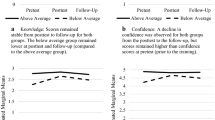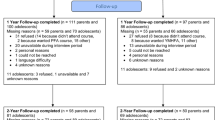Abstract
Youth Mental Health First Aid (YMHFA) is a public education program designed to improve youth mental health outcomes by training adults to notice mental health problems and help youth in seeking treatment. This study used a pre–post 3-month follow-up design to explore whether mental health literacy (MHL), perceived mental health stigma (MHS), and confidence in helping behavior differed across time between Youth Mental Health First Aiders (i.e., involved in Project Advancing Wellness and Resilience in Education) who are and are not members of the mental health workforce. As expected at pretest, mental health workforce first aiders scored significantly higher than non-mental health workforce first aiders for MHL and confidence in helping behavior (p < .001), but no differences were found for MHS. Non-mental health workforce aiders scored significantly better from pretest to posttest for MHL and confidence in helping behavior (p < .001), to levels consistent with participants from the mental health workforce, who did not show improvements at posttest over relatively high pretest levels. With no additional training, non-mental health workforce participants were able to maintain the positive gains at the 3-month follow-up. Results suggest that YMHFA training is effective in increasing non-mental health workforce professionals’ MHL and confidence to a level similar to that of their mental health workforce colleagues. Study findings suggest that YMHFA training may be too basic for mental health workforce professionals, and alternative trainings should be provided for them.

Similar content being viewed by others
References
Aakre, J. M., Lucksted, A., & Browning-McNee, L. (2016). Evaluation of youth mental health first aid USA: A program to assist young people in psychological distress. Psychological Services, 13, 121–126. https://doi.org/10.1037/ser0000063.
Anthony, B. (2016, June 24). Unified Theory of Behavior [Webinar].
Bland, J., & Altman, D. (1997). Cronbach’s alpha. British Medical Journal, 314(7080), 572.
Canady, V. A. (2013, June 6). MH community applauds White House launch of national dialogue. Mental Health Weekly. Retrieved from, http://www.mentalhealthweeklynews.com/Article-Detail/mh-community-applauds-white-house-launch-of-national-dialogue.aspx.
Clay, R. A. (2013). Mental health first aid. American Psychological Association, 44, 32.
Cohen, J. (1988). Statistical power analysis for the behavioral sciences (2nd ed.). Hillsdale, NJ: Lawrence Earlbaum Associates.
Crisanti, A. S., Pasko, D. K., Pyeatt, C., Silverblatt, H., & Anastasoff, J. (2015). Dissemination challenges associated with mental health first aid in New Mexico: Insights from instructors. Journal of Rural Mental Health, 39, 13–21. https://doi.org/10.1037/rmh0000013.
Dew, M. A., Bromet, E. J., Schulberg, H. C., Parkinson, D. K., & Curtis, E. C. (1991). Factors affecting service utilization for depression in a white collar population. Social Psychiatry and Psychiatric Epidemiology, 26, 230.
Gravetter, F. J., & Wallnau, L. B. (2008). Essentials of statistics for the behavioral sciences (6th ed.). Belmont, CA: Wadsworth.
Gryglewicz, K., Childs, K. K., & Soderstrom, M. F. P. (2018). An evaluation of youth mental health first aid training in school settings. School Mental Health, 10, 48–60. https://doi.org/10.1007/s12310-018-9246-7.
Hadlaczky, G., Hökby, S., Mkrtchian, A., Carli, V., & Wasserman, D. (2014). Mental health first aid is an effective public health intervention for improving knowledge, attitudes, and behaviour: A meta-analysis. International Review of Psychiatry, 26, 467–475. https://doi.org/10.3109/09540261.2014.924910.
Henderson, C., Evans-Lacko, S., & Thornicroft, G. (2013). Mental illness stigma, help seeking, and public health programs. American Journal of Public Health, 103, 777–780. https://doi.org/10.2102/AJPH.2012.301056.
Hoge, M. A., Huey, L. Y., & O’Connell, M. J. (2004). Best practices in behavioral health workforce education and training. Administration and Policy In Mental Health, 32, 91–106.
Jorm, A. F. (2000). Mental health literacy: Public knowledge and beliefs about mental disorders. The British Journal of Psychiatry, 177, 396–401. https://doi.org/10.1192/bjp.177.5.396.
Jorm, A. F. (2012). Mental health literacy: Empowering the community to take action for better mental health. The American Psychologist, 67, 231–243. https://doi.org/10.1037/a0025957.
Jorm, A. F., & Kitchener, B. A. (2011). Noting a landmark achievement: Mental health first aid training reaches 1% of Australian adults. Australian and New Zealand Journal of Psychiatry, 45, 808–813. https://doi.org/10.3109/00048674.2011.594785.
Jorm, A. F., Kitchener, B. A., Sawyer, M. G., Scales, H., & Cvetkovski, S. (2010). Mental health first aid training for high school teachers: A cluster randomized trial. BMC Psychiatry. https://doi.org/10.1186/1471-244X-10-51.
Kelly, C. M., Mithen, J. M., Fischer, J. A., Kitchener, B. A., Jorm, A. F., Lowe, A., et al. (2011). Youth mental health first aid: A description of the program and an initial evaluation. International Journal of Mental Health Systems. https://doi.org/10.1186/1752-4458-5-4.
Kitchener, B., & Jorm, A. (2002). Mental health first aid training for the public: Evaluation of effects on knowledge, attitudes and helping behavior. BMC Psychiatry. https://doi.org/10.1186/1471-244X-2-10.
Kitchener, B. A., & Jorm, A. F. (2004). Mental health first aid training in a workplace setting: A randomized controlled trial [ISRCTN13249129]. BMC Psychiatry. https://doi.org/10.1186/1471-244X-4-23.
Kitchener, B. A., & Jorm, A. F. (2008). Mental health first aid: An international programme for early intervention. Early Intervention in Psychiatry, 2, 55–61. https://doi.org/10.1111/j.1751-7893.2007.00056.x.
Kitchener, B. A., Jorm, A. F., & Kelly, C. M. (2012). Youth Mental Health First Aid USA for adults assisting young people [manual]. Washington, D.C.: National Council for Behavioral Health.
Kohn, R., Saxena, S., Levav, I., & Saraceno, B. (2004). The treatment gap in mental health care. Bulletin of the World Health Organization, 82, 858–866.
Kovalchick, K. (2015). Project AWARE grant proposal.
Kutcher, S., Bagnell, A., & Wei, Y. (2015). Mental health literacy in secondary schools. Child and Adolescent Psychiatric Clinics of North America, 24, 233–244. https://doi.org/10.1016/j.chc.2014.11.007.
Kutcher, S., Wei, Y., McLuckie, A., & Bullock, L. (2012). Educator mental health literacy: A programme evaluation of the teacher training education on the mental health high school curriculum guide. Advances in School Mental Health Promotion, 6, 83–93. https://doi.org/10.1080/1754730X.2013.784615.
Lucksted, A., Mendenhall, A. N., Frauenholtz, S. I., & Aakre, J. M. (2015). Experiences of graduates of the mental health first aid—USA course. International Journal of Mental Health Promotion, 17, 169–183. https://doi.org/10.1080/14623730.2015.1013670.
Mental Health First Aid. (2009). Retrieved from https://www.mentalhealthfirstaid.org/.
Muthén, L. K., & Muthén, B. O. (2017). Mplus User’s Guide (8th ed.). CA: Los Angeles.
O’Dwyer, L. M., & Parker, C. E. (2014). A primer for analyzing nested data: Multilevel modeling in SPSS using an example from a REL study. Retrieved from Regional Educational Laboratory at EDC Website: https://ies.ed.gov/ncee/edlabs/regions/northeast/pdf/REL_2015046.pdf.
O’Connor, M., & Casey, L. (2015). The mental health literacy scale (MHLS): A new scale-based measure of mental health literacy. Psychiatry Research, 229, 511–516. https://doi.org/10.1016/j.psychres.2015.05.064.
Ross, A. M., Hart, L. M., Jorm, A. F., Kelly, C. M., & Kitchener, B. A. (2012). Development of key messages for adolescents on providing basic mental health first aid to peers: A delphi consensus study. Early Intervention in Psychiatry, 6, 229–238. https://doi.org/10.1111/j.1751-7893.2011.00331.x.
Rotheram-Borus, M. J., Swendeman, D., & Chorpita, B. F. (2012). Disruptive innovations for designing and diffusing evidence-based interventions. American Psychologist, 67, 463476. https://doi.org/10.1037/a002818.
Sickel, A. E., Seacat, J. D., & Nabors, N. A. (2014). MHS update: A review of consequences. Advances in Mental Health, 12, 202–215.
State of Michigan. (2015). Mental health professional list. Unpublished handout.
Tavakol, M., & Dennick, R. (2011). Making sense of Cronbach’s alpha. International Journal of Medical Education, 2, 53–55. https://doi.org/10.5116/ijme.4dfb.8dfd.
U.S. Census Bureau. (2015, July 1). State & county Quickfacts: Kent County, Hillsdale County, Jackson County, Oakland County, MI. Retrieved January 27, 2017, from http://quickfacts.census.gov.
Van de Velde, S., Broos, P., Van Bouwelen, M., De Win, R., Sermon, A., Verduyckt, J., et al. (2007). European first aid guidelines. Resuscitation, 72, 240–251. https://doi.org/10.1016/j.resuscitation.2006.10.023.
Why Mental Health First Aid. (2018). Retrieved from https://www.thenationalcouncil.org/training-courses/mental-health-first-aid/.
Funding
This manuscript was supported by the Project AWARE grant.
Author information
Authors and Affiliations
Corresponding author
Ethics declarations
Conflict of interest
The authors declare no conflict of interest.
Appendix: Training Survey
Appendix: Training Survey
Please check whether you agree, disagree, or are unsure of the statements below (1–15)
Statement | Agree | Disagree | Don’t Know |
|---|---|---|---|
1. It is not a good idea to ask someone if they are feeling suicidal in case you put the idea into his or her head. | |||
2. Depression tends to show up earlier in a young person’s life than anxiety. | |||
3. If a young person experiences a trauma, it is best to make him or her talk about it as soon as possible. | |||
4. They may not need it right away, but eventually everyone with a mental health problem needs professional treatment. | |||
5. Knowledge about the impact of medication for youth is limited compared to what we know about adults. | |||
6. It is best to get a person having a panic attack to breathe into a paper bag. | |||
7. A first aider can distinguish a panic attack from a heart attack. | |||
8. Exercise can help relieve depressive and anxiety disorders. | |||
9. Schizophrenia is a relatively common diagnosis for youth under the age of 18. | |||
10. It is best not to try to reason with people having delusions. | |||
11. People who talk about suicide don’t complete suicide. | |||
12. When talking to someone about suicide, it is best to be indirect and not use the word “kill” so that you don’t upset the person. | |||
13. Trauma is a risk factor in almost every type of mental illness. | |||
14. Spirituality can be a protective factor—keeping a young person from developing a mental illness or minimizing the impact of the illness. | |||
15. People with mental health problems tend to have a better outcome if family members are not critical of them. |
Please circle the number that best reflects your beliefs for questions 16–25
Statement: I believe that… | Strongly Disagree | Strongly Agree | |||
|---|---|---|---|---|---|
16. School-aged youth with mental health problems are difficult students in class because they are dramatic and act out for attention. | 1 | 2 | 3 | 4 | 5 |
17. School-aged youth use their mental health problems as an excuse to get out of school-related responsibilities. | 1 | 2 | 3 | 4 | 5 |
18. School-aged youth with mental health problems have difficulty working with other students in a group setting. | 1 | 2 | 3 | 4 | 5 |
19. School-aged youth with mental health problems avoid seeking professional help because they are scared peers would find out and treat them differently. | 1 | 2 | 3 | 4 | 5 |
20. School-aged youth with mental health problems avoid seeking professional help because they are scared teachers would find out and treat them differently. | 1 | 2 | 3 | 4 | 5 |
Statement | Strongly Disagree | Strongly Agree | |||
|---|---|---|---|---|---|
21. I feel confident in my ability to ask school-aged youth questions that determine whether they are at risk to physically harm themselves or others. | 1 | 2 | 3 | 4 | 5 |
22. I have the skills necessary to patiently listen and not judge school-aged youth when they talk about their mental health problems. | 1 | 2 | 3 | 4 | 5 |
23. I feel comfortable in helping school-aged youth feel reassured that supports are available when they are experiencing mental health problems. | 1 | 2 | 3 | 4 | 5 |
24. I feel confident in my ability to refer a school-aged youth who is experiencing mental health problems to appropriate school-based and/or community-based resources. | 1 | 2 | 3 | 4 | 5 |
25. I have the knowledge necessary to recommend effective self-help strategies to school-aged youth experiencing mental health problems. | 1 | 2 | 3 | 4 | 5 |
Rights and permissions
About this article
Cite this article
Haggerty, D., Carlson, J.S., McNall, M. et al. Exploring Youth Mental Health First Aider Training Outcomes by Workforce Affiliation: A Survey of Project AWARE Participants. School Mental Health 11, 345–356 (2019). https://doi.org/10.1007/s12310-018-9300-5
Published:
Issue Date:
DOI: https://doi.org/10.1007/s12310-018-9300-5




